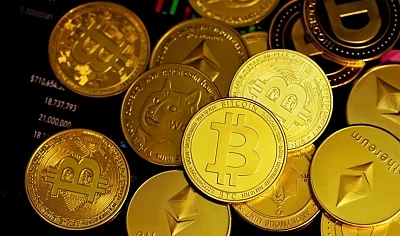The central government issued a circular on Wednesday, 22 June, clarifying the rules regarding the 1 percent tax deduction at source (TDS) on cryptocurrencies and virtual digital assets (VDAs).
The rules are part of the newly added section 194S of the Income Tax Act, which was announced with the Union Budget 2022-23 in February. They will come into effect on 1 July 2022.
The budget announcement in February also mentioned that a 30 percent tax would be levied on any income from the transfer of crypto assets or any virtual digital asset.
Here are the highlights of the circular.
When will TDS be applicable?
TDS will be applicable when the value or aggregate value of the consideration for transfer of VDA exceeds Rs 50,000 during the financial year in the case of consideration being paid by a specified person (buyer), and Rs 10,000 in other cases.
Since the threshold is with respect to the financial year, the calculation of consideration for transfer of VDA triggering TDS deduction shall be counted from 1 April 2022.
A 'specified person' is an individual or Hindu Undivided Family (HUF) who does not have any income under the head 'profit and gains from business and profession' or one whose total sales/gross receipts/turnover from business does not exceed Rs 1 crore or, in case of profession, does not exceed Rs 50 lakh.
Who will deduct TDS?
In a peer-to-peer (direct buyer to seller) transaction, the buyer (person paying the consideration) is required to deduct tax.
In a case where the transfer of VDA takes place on or through an exchange and the VDA being transferred is owned by a person other than the exchange, tax may be deducted only by the exchange which is crediting or making payment to the seller.
In a case where the credit/payment between the exchange and the seller is carried out through a broker (and the broker is not the seller), the responsibility to deduct tax shall be on both the exchange and the broker.
However, if there is a written agreement between the exchange and the broker that the broker shall be deducting tax on such credit/payment, then broker alone may deduct the tax.
In a case where the transfer of VDA takes place on or through an exchange that owns the VDA, the buyer is required to deduct tax. As an alternative, the exchange may enter into a written agreement with the buyer or his broker to pay the tax before the due date for that quarter.
What if the buyer pays in kind or with another VDA?
If the buyer pays in kind, then they have to deduct tax. In a situation where one VDA is being exchanged for another, both the persons are buyers as well as sellers, and both have to deduct tax.
In these situations, the buyer is required to ensure that tax has been paid before the payment is made.
However, if the transaction is through an exchange, as an alternative, tax may be deducted by the exchange to make things easier, based on a written contractual agreement with the buyers/sellers.
Can payment gateways deduct TDS?
In transactions where payment is being carried out through payment gateways, there may be tax deductions twice. To address this problem, the government clarified that the payment gateway will not be required to deduct tax if the tax has been deducted by the buyer.
To facilitate proper implementation, the gateway may take an undertaking from the buyer regarding deduction of tax.
Apart from gaining extra tax revenue, with the crypto income tax and TDS, the government is looking to reduce the number of casual investors engaging in the crypto market without proper research or an understanding of the risks involved.
The RBI had earlier voiced "serious concerns" around private cryptocurrencies and the financial instability that they might cause.
Some see the crypto taxation as the government legitimising crypto, but that may not be the case, since the Income Tax Act allows the government to collect taxes from illegal transactions as well. Only cryptocurrency regulations will provide clarity on this issue, but it is unlikely that a crypto bill will be introduced in this session of Parliament.
(At The Quint, we question everything. Play an active role in shaping our journalism by becoming a member today.)
